10 Tricks to Reduce Knee Pain Through Your Diet


Written and verified by Doctor Carlos Fabián Avila
The knee is a hinge joint made up of bones, muscles, tendons, ligaments and liquids. When any of these suffers an injury, it becomes necessary to find a way to reduce knee pain.
Tendons and muscles enable the knee to move and bend to walk or jump, among other movements. When one of these structures becomes inflamed, breaks, or is hurt, knee problems can arise. In this article, discover how you can improve knee pain through your diet.
Some considerations about knee pain

Knee pain is one of the discomforts that can limit you when completing daily activities such as exercise, weight lifting and even walking.
It’s important to remember that knee problems can occur at any age, not just in old adults. These issues may not be directly related to age or to bone or muscle weakness.
The important thing is to seek medical help as soon as the discomfort begins so that your knee can be thoroughly examined and treated in time. This will prevent major complications that can lead to surgery.
In addition to seeing your doctor, you can take advantage of the benefits of some foods that help reduce knee pain naturally.
10 tricks to reduce knee pain through your diet
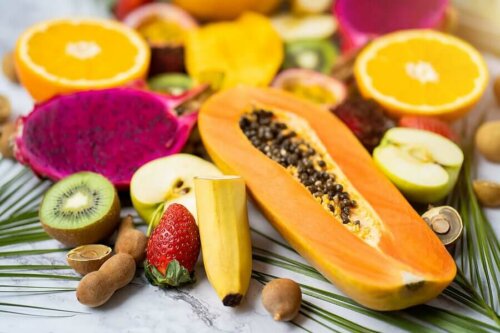
1. Eliminate junk food from your diet as soon as possible
Junk food is one of the greatest enemies of knee health, as they contribute to the development of diseases such as excess weight and obesity, which can produce knee pain.
Industrial products and junk food don’t provide nutrients. Instead, they provide excess fat, sugar, and salt to your diet, among others. These promote inflammatory processes and can even affect the knee joints.
A study published in 2013 indicates that:
“Fast foods become harmful when they become a habit, since they contain an excess of energy, favoring or promoting an increase in body weight.”
Some examples of healthy eating plans are the Mediterranean diet and the Harvard plate.
2. Eat more eggs
Eggs contain the nutrients needed to protect joints and reduce knee pain. You can add them to your diet in multiple ways, so they’re perfect for experimenting with in the kitchen.
3. Include fish regularly in your diet
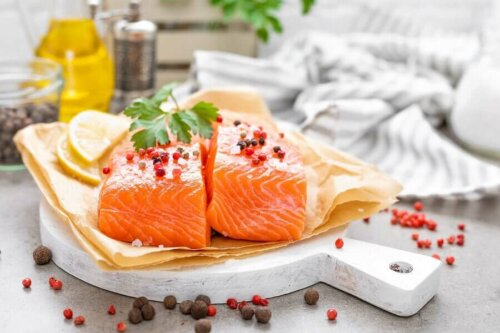
There’s a great variety of fish, so it shouldn’t be difficult to find some that are affordable and delicious.
4. Consume whey
We suggest consuming whey once a day to reduce knee pain. Its benefits come from the nutrients that it provides, especially calcium. These nutrients not only lessen discomfort, but also help maintain healthy bones.
5. Add turmeric to your diet
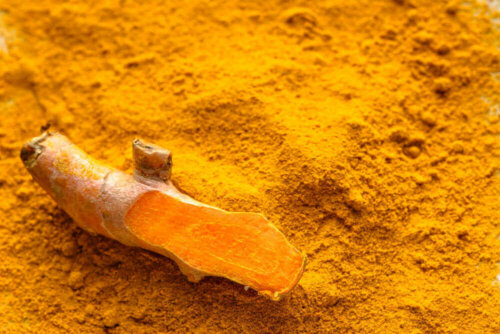
This is a spice that’s rich in antioxidants and, due to its curcumin contents, has anti-inflammatory properties. It’s widely known in the East and now in the West.
You can consume it in different ways in your diet, such as:
- In salads.
- As main courses (stews).
- As a vegetable dressing.
- In drinks (mixed with milk, for example).
6. Eat bananas
Another food that will help you reduce knee pain is banana. Among the many nutrients that this fruit contains, potassium and magnesium stand out. These minerals help improve bone health and help gradually decrease knee pain.
7. Include tofu in your diet
You can consume it as often as you like. Of course, you must be careful not to consume raw tofu, as it causes indigestion problems.
Tofu is rich in calcium. Thus, it’ll help improve bone health and, in a way, reduce pain in the knee and other joints.
8. Eat beans
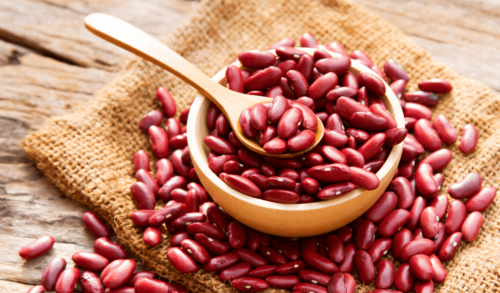
Beans contain a lot of protein that helps to relieve knee pain. It’s advisable to consume them several times a week as a protein source and to regenerate ligaments and joint muscles.
If you’re diabetic, however, you should monitor the amount of beans you consume because eating more than one cup a day can raise your glucose levels.
9. Use olive oil
Olive oil is one of the most recommended sources of fat, along with avocado. Like blue fish, it’s rich in omega 3 fatty acids and other essential nutrients that contribute to the health of the entire body and, thus, help to keep discomfort such as knee pain at bay.
To take advantage of all the benefits of olive oil, we recommend consuming it in different ways in your diet. For more inspiration, search for some Mediterranean diet recipes!
Discover: Fats Are Essential in the Diet
10. Avocado
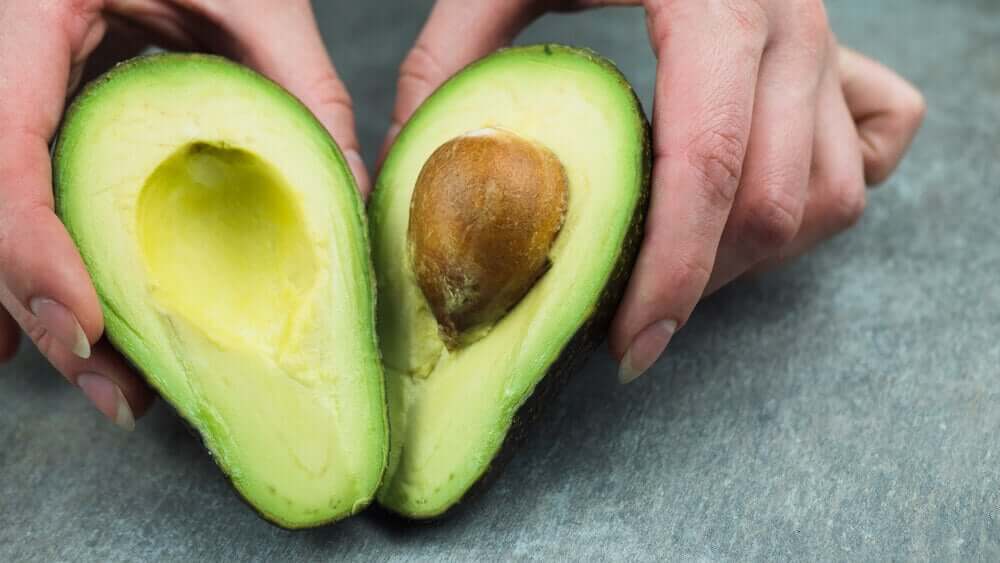
Avocado is a source of monounsaturated fatty acids, unsaturated fatty acids, potassium, and vitamins C, E, and B6. Thus, it’s a recommended food to supplement the diet in a healthy way.
According to experts from the Spanish Nutrition Foundation (FEN), an average 200 g avocado provides 33% of the recommended intakes of vitamin B6 for a man between 20 and 39 years of age with moderate physical activity and 38% in the case of women with the same characteristics.
Also, it’s a source of potassium, a nutrient that contributes to the normal functioning of the nervous system and muscles.
Final note
As you may have seen, through proper nutrition and other good lifestyle habits, you can reduce knee pain naturally.
However, just because you’re adopting good lifestyle habits doesn’t mean you should dismiss your doctor’s recommendations. Thus, try to pay attention to what they tell you in all your check-ups to be able to take good care of your health and enjoy well-being.
All cited sources were thoroughly reviewed by our team to ensure their quality, reliability, currency, and validity. The bibliography of this article was considered reliable and of academic or scientific accuracy.
- Arendt-Nielsen, L., Nie, H., Laursen, M. B., Laursen, B. S., Madeleine, P., Simonsen, O. H., & Graven-Nielsen, T. (2010). Sensitization in patients with painful knee osteoarthritis. Pain. https://doi.org/10.1016/j.pain.2010.04.003
- Bumbaširevic, M., Lešic, A., & Bumbaširevic, V. (2010). Anterior knee pain. Orthopaedics and Trauma. https://doi.org/10.1016/j.mporth.2009.06.005
- Dreher, M. L., & Davenport, A. J. (2013). Hass Avocado Composition and Potential Health Effects. Critical Reviews in Food Science and Nutrition. https://doi.org/10.1080/10408398.2011.556759
- Hewlings, S., & Kalman, D. (2017). Curcumin: A Review of Its’ Effects on Human Health. Foods. https://doi.org/10.3390/foods6100092
- Rodríguez-Carpena, J. G., Morcuende, D., Andrade, M. J., Kylli, P., & Estevez, M. (2011). Avocado (Persea americana Mill.) phenolics, in vitro antioxidant and antimicrobial activities, and inhibition of lipid and protein oxidation in porcine patties. Journal of Agricultural and Food Chemistry. https://doi.org/10.1021/jf1048832
- Oliva Chávez, Oscar Humberto, Fragoso Díaz, Socorro,Consumo de comida rápida y obesidad, el poder de la buena alimentación en la salud. RIDE Revista Iberoamericana para la Investigación y el Desarrollo Educativo [Internet]. 2013;4(7):176-199. Recuperado de: https://www.redalyc.org/articulo.oa?id=498150315010
This text is provided for informational purposes only and does not replace consultation with a professional. If in doubt, consult your specialist.








